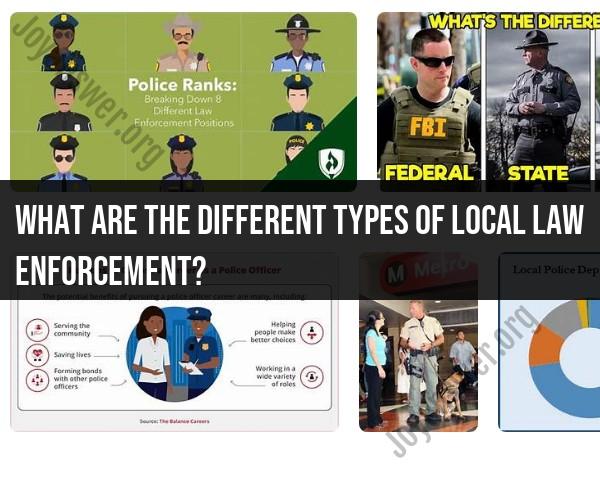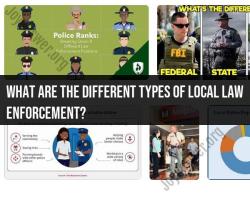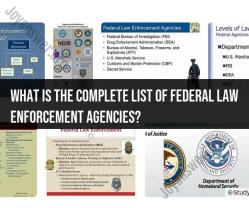What are the different types of local law enforcement?
Local law enforcement agencies play a crucial role in maintaining public safety and enforcing laws within specific jurisdictions. The types of local law enforcement agencies can vary, but here are some common categories:
Police Department:
- City Police: Responsible for law enforcement within city limits.
- Municipal Police: Similar to city police, these departments serve municipalities or towns.
County Sheriff's Office:
- County Sheriff's Department: Typically responsible for law enforcement in unincorporated areas and may provide support to city police when needed.
- Sheriff's Office: Led by an elected sheriff, responsible for maintaining order in the county, running the county jail, and serving legal documents.
State Police/Highway Patrol:
- State Police: Enforce state laws, often focusing on highways and state-owned properties.
- Highway Patrol: Primarily responsible for patrolling highways, ensuring traffic safety, and responding to accidents.
Tribal Police:
- Enforce laws within Native American reservations or tribal lands. Tribal police have jurisdiction over offenses committed on tribal lands.
Transit Police:
- Provide law enforcement services on public transportation systems, including buses and trains.
Port Police:
- Patrol and ensure security in seaports and airports, dealing with maritime and aviation-related law enforcement issues.
School Resource Officers (SROs):
- Assigned to schools to maintain a safe learning environment, build positive relationships with students, and handle law enforcement matters on school grounds.
Park Rangers:
- Responsible for enforcing laws within national, state, or local parks and recreational areas.
Housing Authority Police:
- Provide law enforcement services for public housing communities.
Corrections Officers:
- Work within jails and prisons, responsible for the security, custody, and control of inmates.
- Specialized Units:
- Many local law enforcement agencies have specialized units, such as SWAT teams, K-9 units, narcotics units, and cybercrime units, to handle specific types of incidents or crimes.
- Community Policing Teams:
- Engage with the community to build trust, address concerns, and collaborate on crime prevention strategies.
It's important to note that the specific names and structures of law enforcement agencies can vary based on the country, state, or region. Additionally, some areas may have multiple agencies with overlapping jurisdictions, necessitating collaboration to ensure public safety.
1. Types of Local Law Enforcement Agencies and their Differences:
There are several types of local law enforcement agencies, each with its own jurisdiction and responsibilities:
- Municipal Police Departments: Responsible for law enforcement within city limits. Responsibilities include patrol, investigations, community engagement, and traffic enforcement. Size and scope vary based on the city's population and needs.
- County Sheriff's Offices: Serve the entire county, including unincorporated areas and smaller towns without their own police force. Duties include patrolling rural areas, serving warrants, providing court security, and operating the county jail. Typically larger and more diverse in responsibilities than municipal police.
- Tribal Police Departments: Enforce tribal laws on designated reservation lands. May also work with federal agencies on certain crimes. Jurisdiction and responsibilities vary based on tribal agreements and treaties.
- Special Jurisdiction Agencies: Focus on specific areas or activities, such as park police, transit police, school district police, housing authority police, airport police, etc. Their authority is limited to their specific jurisdiction and tasks.
Key Differences:
- Jurisdiction: Municipal police have the smallest, county sheriffs the largest, and special jurisdiction agencies cover specific areas.
- Responsibilities: Municipal and county agencies handle general law enforcement, while special jurisdiction agencies focus on their specific areas.
- Funding: Sources of funding can differ, with municipal police primarily funded by city taxes, sheriffs by county taxes, and special agencies often through user fees or partnerships.
- Organization: Size and structure vary depending on the agency and jurisdiction.
2. Municipal Police vs. County Sheriff's Offices vs. State Police:
- Municipal Police: Primarily responsible for patrol, traffic enforcement, and investigations within city limits. Often have specialized units for K-9, SWAT, or community outreach. Generally closer community ties and more focus on specific neighborhood issues.
- County Sheriff's Offices: Broader responsibilities covering larger areas, including rural patrols, warrant service, court security, and operating the county jail. May have limited patrol presence in populated areas. Often handle major crimes or incidents beyond the capacity of smaller agencies.
- State Police: Primarily responsible for enforcing state laws, patrolling highways, investigating major crimes, and providing assistance to local agencies. Jurisdiction covers the entire state and focuses on broader issues or crimes crossing over local boundaries.
Key Differences:
- Jurisdiction: Size and scope of patrol area differ significantly.
- Responsibilities: Municipal police focus on city issues, sheriffs have wider duties including court and jail operations, while state police handle broader statewide matters.
- Focus: Municipal and county agencies often have closer community ties, while state police prioritize enforcing state laws and major crimes.
- Organization: State police tend to be more centralized and larger than local agencies.
3. Specialized Law Enforcement Agencies:
Yes, there are numerous specialized law enforcement agencies addressing specific community needs. Some examples include:
- School District Police: Patrol schools, investigate threats, and respond to incidents involving students and staff.
- Park Police: Protect public safety and enforce laws in parks and recreation areas.
- Transit Police: Ensure safety and security on public transportation systems.
- Housing Authority Police: Patrol public housing communities and address crime-related issues.
- Airport Police: Maintain security and enforce laws at airports.
- Environmental Police: Investigate environmental crimes and enforce environmental regulations.
- Wildlife Officers: Enforce fish and game laws and protect wildlife populations.
These agencies provide targeted expertise and focus on specific areas or populations within the broader law enforcement landscape.
I hope this explanation helps! Feel free to ask any further questions you may have about specific types of local law enforcement agencies.








